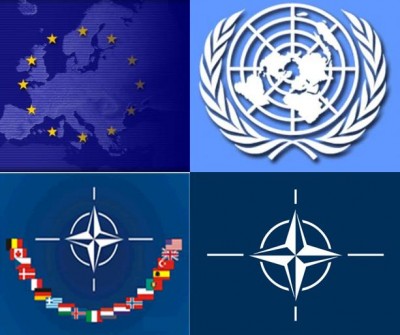Economic Warfare: US-EU Sanctions directed against Russia. Energy, Finance, Defense

Arms producer Kalashnikov and oil giant Rosneft are among Russian companies hit by a new round of EU sanctions, which have come into effect Friday morning upon being published in the EU Official Journal.
The sanctions target the finance, energy and defense sectors. The union has restricted three Russian energy companies from raising long-term debt on European capital markets – Rosneft, Transneft and Gazprom Neft.
The EU has also halted services Russia needs to extract oil and gas in the Arctic, deep sea and shale extraction projects.
The export of any technology considered military ‘dual-use’ has been banned from nine Russian companies, including the manufacturer of Kalashnikov rifles.
Five major Russian state-owned banks – Sberbank, VTB, Gazprombank, Vnesheconombank (VEB) and Rosselkhozbank – have been banned from receiving any long-term (over 30-day) loans from EU companies.
Brussels has also added 24 individuals to the list, blocking travel to the EU and freezing assets. Russian MPs and businessmen, as well as politicians in Crimea and Donbass, are on the blacklist.
The US is going to join the EU initiative with its own set of sanctions to be announced later in the day.
READ MORE: Finance, energy & defense sectors: EU and US set to impose new Russia sanctions
The EU package of sanctions against Russia was adopted on Monday, and had to be officially published before coming into force.
Brussels has said the list of sanctions could be reviewed and they could be revoked if the situation in Ukraine improves.
“Depending on the situation on the ground, the EU stands ready to review the agreed sanctions in whole or in part,” the president of the European Council, Herman Van Rompuy said in a statement.
READ MORE: Moscow on sanctions: ‘EU unwilling to see Russia’s efforts on Ukraine’
Moscow has described the sanctions as counter-productive and coming at the wrong moment, when Russia has helped negotiate the latest ceasefire in Ukraine and has already signaled its commitment to facilitating peace in the region.
The presidential spokesman, Dmitry Peskov, said on Thursday that Brussels either fails to see or “is unwilling to see the real situation in Donbass and does not want to get informed about the steps the parties are taking towards settlement.”
Russian authorities have vowed to support the companies hit by Western sanctions and have promised to adopt a package of retaliatory sanctions in response.


